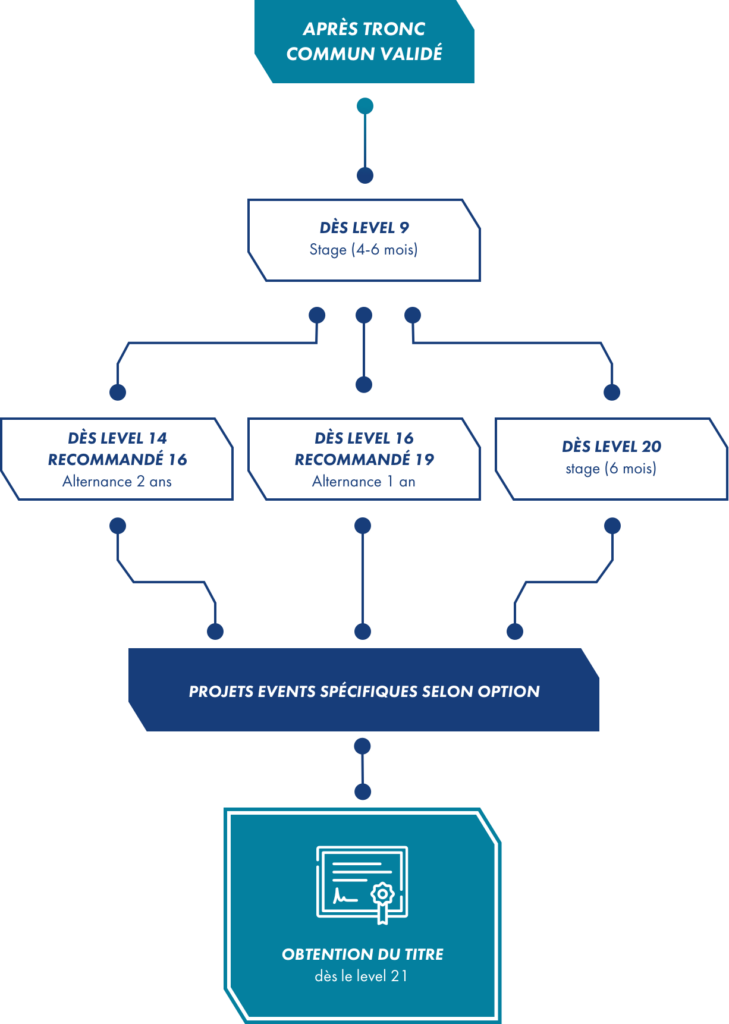
EXPERT IN INFORMATION TECHNOLOGY ARCHITECTURE
Certified title in the National Directory of Professional Certifications (RNCP) Level 7
TRAINING OBJECTIVES
42 aims to make digital opportunities available to everyone, everywhere. The certification of Expert in Information Technology Architecture aims to enable professional integration in a high-demand field. It provides all the necessary skills to progress either in the domain of information system network architecture or in the growing field of database development and data management.
HOW TO ACESS
From the age of 18, after admission to 42 (successful completion of online games, attendance in check-ins, and validation of the Piscine), and completion of the first part of the curriculum at 42 called the Common Core.
TRAINING PROCESS
Following the validation of the first internship (4 to 6 months) starting from level 9, you need to reach level 21 by validating the specific projects of the program, as well as your choice:
- 2 years of apprenticeship starting from level 14 (recommended level: 16)
- or 1 year of apprenticeship starting from level 16 (recommended level: 19)
- or a second 6-month internship starting from level 20

SKILL BLOCKS
Technical Specifications Design for a Digital Solution
- Conduct continuous technological monitoring in various digital-related domains
- Enhance digital skills
- Define the needs of the company/organization and/or users
- Write and formalize the client’s requirements in a technical specifications document
Project Management and Coordination of IT Project Implementation
- Participate in recruitment and training actions for the project team
- Establish data security needs and selection criteria
- Select necessary suppliers and service providers for project execution
- Create the project’s organizational plan
- Manage project team members and providers
Supervision of Production Deployment, Monitoring, and Process Improvement
- Conduct and oversee functional verifications on the architecture with dedicated teams
- Conduct and oversee load testing on the architecture with dedicated teams
- Implement knowledge transfer
- Control project realization by technical teams
- Implement evolutionary maintenance of applications
- Perform programming for updates
Information Systems Network Architecture (Option 1)
- Create software that manipulates the fundamentals of an operating system through an interface
- Use parallel and concurrent programming
- Complete a network architecture project
- Implement an IP network architecture through a proper understanding and application of machine connection principles
- Configure an operating system
- Ensure cybersecurity within the structure
Database Architecture and Data (Option 2)
- Identify and analyze data management policies and systems within the company
- Ensure data structuring
- Process structured data
- Represent processed data results through graphs, animations, or other forms of data visualization and classification
- Interpret and exploit data within the company context
INDUSTRY SECTORS
The role of experts in computer architecture varies depending on where they work:
- In user companies, they can provide ongoing guidance and act as advisors to the Chief Information Officer. They may also supervise teams of architects and technical experts.
- In service companies, their role primarily involves technical expertise and auditing for clients. In this context, they might respond to requests for proposals, define the company’s service offerings, and coordinate actions with other experts in project contexts.
Furthermore, as the web has become a component of all business applications, “web architecture issues are becoming more and more similar to those of enterprise information system architectures.” Therefore, experts in computer architecture in today’s businesses are often required to integrate both aspects: the entire information system and web architecture. As a result, they can work in both large and small companies across various sectors, as mastery of IT has become essential for overall performance and workforce organization in the job market.
JOB OPPORTUNITIES
The profession of expert in computer architecture belongs to the categories of the ROME code M1802 “Expertise and support in information systems.” This role, which holds significant responsibility, encompasses various tasks, including advising the IT management on new technical developments and solutions, providing technical support and assistance to IT teams, and ensuring compliance with quality and security standards and procedures. With highly specialized skills in their field, experts in computer architecture may be involved in all or part of a project within their area of expertise.
Similar job titles:
- Web Architect
- System, Storage, and Network Architect
- Global Infrastructure Architect
- Technical/Web Solutions Architect
- IT Project Manager
- Software Engineer in Infrastructure
- IT Engineer / Information System Engineer
- Data Engineer / Big Data Engineer
- Chief Data Analyst / Big Data Architect

